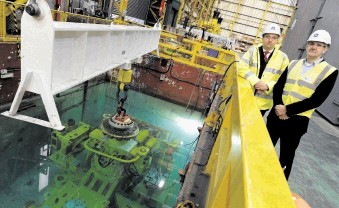
Technology and simplification are the critical factors to recovery, according to GE leader Neil Saunders.
The newly appointed chief executive of subsea and drilling sat down with Energy Voice a month after taking up his new role.
Four weeks in, the industry veteran is faced with moving a traditionally “capital intensive” business stream ahead in a sub $30 oil climate.
“The biggest learning as an industry is to realise what extent customisation, uniqueness and engineering drives uncompetitive costs,” he said.
“I think technology and simplification can help us stay in front of this challenge.”
However, despite crippling jobs losses, Aberdeen is moving in the right direction, according to Saunders.
“I would say we’re on the right track,” he said.
“I think the investment in the technology sector is fantastic for Aberdeen, and why I like that so much is that it positions Aberdeen to be part of a global oil and gas business, specifically subsea, as opposed to being European-based and feeding technology into the North Sea, which it already does really well.
“It takes us closer to what I think of as a Norwegian model where we can incubate technology inside academia, which is going to be incredibly powerful for the city.”
Saunders warned the one place subsea industry could struggle to recover from is talent.
“I think the most important thing that we have to do not only as a company but also an industry is to keep the best talent and keep the capability that we worked so hard to get through 2011 to 2013,” he said.
“We were talking about a talent war and talking about the tough demographic we had in terms of the population that was working in subsea and almost every company went in to the market to attract fresh talent into subsea,” he said.
“We took a lot of time telling everybody how cool it was and then put people on career paths only to find that potentially we would have to put people out and that’s a shame.
“That’s going to make it hard in the recovery.
“From a leadership standpoint it’s about trying to keep that capability going, trying to stay in front of the some of these issues, being very visible inside the business and being prepared to explain some the decisions we’re taking.”
The need to safeguard future generations of talent heightens the importance of frank, open discussion between operators and service firms – discussions Saunders believe are starting to make headway.
“There’s a level of open-mindedness and the doors are open to conversations about any kind of innovation, not just technological innovation,” he said.
“These subsea projects are good projects with significant reserves, but they are very capital intensive.
“Previously I would say those conversations were listened to and now they’re being encouraged, so it’s a different world in my perspective.”
A world that is encouraging major players like Schlumberger to take an equity stake in the Fortuna project.
“I think more performance related contracts will be relevant, where a supplier may supply equipment on a deferral basis, which may be performance related,” Saunders aid.
“I think more service models will come in which will be much more OPEX orientated. We would potentially able to lease equipment as an OEM instead of having to sell equipment. I think those things are going to happen more and more.”
He added: “I feel pretty confident that in the upturn companies will still be there. Commercial models may look a little different, but that’s okay.”
But if different means “simpler” replacing “bespoke” then to according to Saunders that’s a success.
Recommended for you
